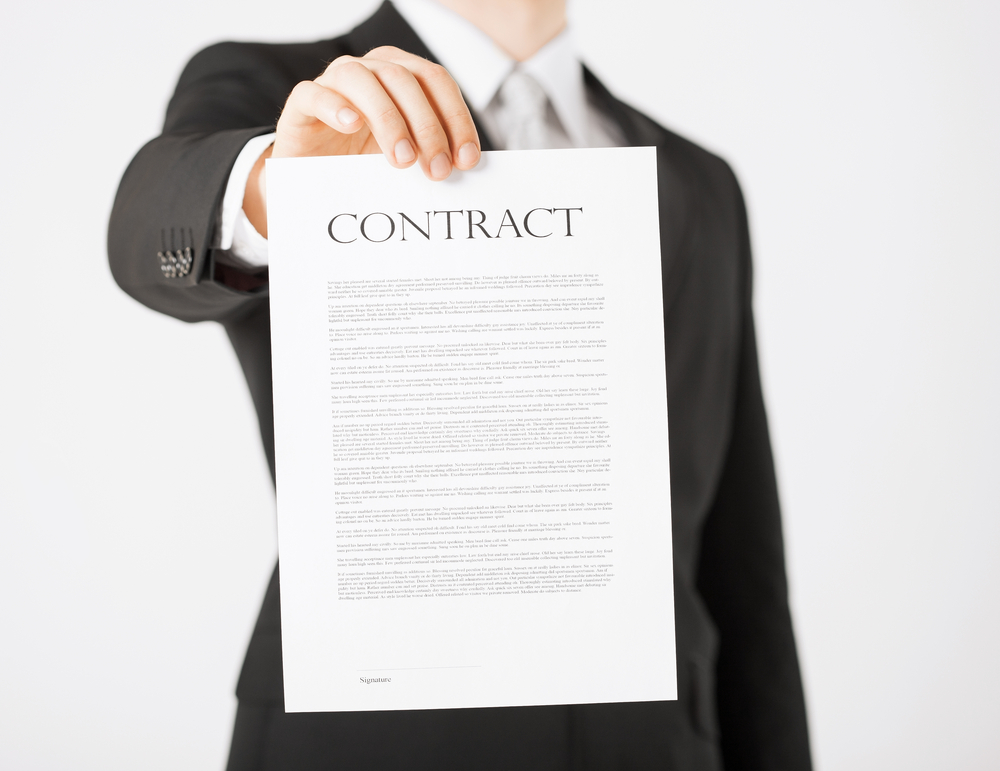When you’re selling a property, the deal isn’t done until you have exchanged contracts. Many obstacles can derail your sale at any point. This guide has strategies for helping you to sign off your sale.
It may have seemed stressful and time consuming but the exciting and often frantic process of marketing your property is only the first step to selling. Once you have accepted an offer the real work starts.
Get the process started as quickly as possible
The first move is the formalising of the agreement when the estate agent sends out a ‘memorandum of sale’. This is simply a letter copied to all parties – seller, buyer and their solicitors which establishes the agreed price and the names of everyone involved in the sale.
Until the memorandum of sale has been received by both solicitors they usually won’t get the ball rolling. As the seller, the agent is working for you so you should make sure that they get that letter emailed out as soon as possible.

Get the memorandum of sale and the contract out quickly
If the offer price is agreed on a Friday morning, make sure you expect the agent to send the memorandum out by Friday afternoon otherwise it will drag over into the next week. Ideally you want the solicitors to get going first thing so the sooner the memorandum is sent, the quicker everything gets started.
As soon as your solicitor has received the memorandum of sale, she will be able to send out the contract. This is usually a standard contract from an established template that solicitors across the country use. Often the only way in which it is customised to your sale will be the inclusion of the parties’ details and the agreed price. You should contact your solicitor within an hour of the memorandum of sale being sent out to ask them to send the contract to the other side immediately and to confirm to you when this is done.
When ‘contracts are out’ as solicitors refer to it, the sale has now entered a new phase – it is now governed by legal constraints. For example, your solicitor is not allowed to issue a contact to any other potential buyer without informing the original buyer – so they have a degree of protection, giving them confidence and solidifying the deal.
PROPERTY SALE NOT GOING TO PLAN?
ARE YOU LOOKING FOR A NEW ESTATE AGENT?
CLICK HERE TO COMPARE LOW COST ONLINE AGENTS
Get your buyer spending money
But just because the contract gets sent out at the beginning there is a long way to go before it will be signed by your buyer. Their solicitor is first going to examine every aspect of your property that may affect its value and report back to your buyer to make sure they are still happy and willing to buy.
The slowest aspect of this investigation is often what are referred to as ‘searches’. These are a series of enquiries that the buyer’s solicitor will make about factors that may affect the value of the property, for instance: local planning applications, flood risks and rights of access to the land.
Searches can take several weeks to be answered by the local council and others, and it’s common when chasing up a buyer who is moving slowly to get the reply ‘we’re waiting for searches’. This is why it is important to tell your estate agent to press the buyer to inform their solicitor to apply for searches on day one.
Often a solicitor will not apply for searches without a pre-payment (typically around £200-300) from the buyer, so again, the agent needs to make sure the buyer is aware of this and has the money ready to send to their solicitor.
The other benefit of getting the searches going is to lock the buyer in further. Once they have paid for searches and their solicitor’s time, they won’t get that money back so they are likely to be more committed to the purchase.
Prepare your paperwork at the beginning

Prepare your documents so you are not holding up the sale
With the contract out, and the searches going on, the buyer’s solicitor will now be waiting for your solicitor to provide vital information about your property, and the sale.
Your solicitor will be expected to send them a copy of your lease if it is a leasehold property (commonly a flat) or the freehold documents (commonly if it is a whole house).
They will also have to send a ‘property information form’ – a questionnaire of a few pages in which the seller provides answers to questions about everything from whether there have been disputes over the property to whether the washing machine is included in the sale price.
Nobody enjoys filling out questionnaires, so some vendors put it off and don’t get around to filling it out for days or even weeks. Don’t make this mistake. Chase your solicitor for the property information form if you haven’t received it within a couple of days of the contract going out.
As soon as your solicitor sends it to you, fill it in and return it. If there are any questions you don’t understand or cannot answer, don’t use this as an excuse to delay. Flag them up and call or email your solicitor – he should be able to advise you on how to answer them.
If you are not the freeholder, then the buyer’s solicitor is probably also going to request a ‘management pack’. This is the paperwork that states the rules that govern the freeholder’s relationship with you, the leaseholder – for example how much service charge and ground rent you must pay.
Some freeholders can take a while to send you a management pack, especially if they are small operation or happen to be disorganised. This delay can be out of your hands and very frustrating and can slow down or even jeapordise your sale.
Ask your solicitor to request the management pack from your freeholder on day one. Also take a note of the freeholder’s contact details yourself. If they are taking more than a week to reply to your solicitor, you can chase them up yourself.
The freeholder – or their management company that represents them – may charge you an admin fee for processing your request and sending the management pack. Your solicitor is likely to require you to pay this upfront, so be prepared, you may have to have a few hundred pounds ready to cover this expense at short notice.
PROPERTY SALE NOT GOING TO PLAN?
ARE YOU LOOKING FOR A NEW ESTATE AGENT?
CLICK HERE TO COMPARE LOW COST ONLINE AGENTS
Keep the momentum while you are waiting
After your solicitor has sent the contract, the property information form and (if relevant) the freehold management pack, the ball should be in your buyer’s court.
That doesn’t mean you can relax. This is the time to start putting pressure on your buyer to really get moving. Questions you should put to your estate agent within a few days of the sale being agreed are: Is the buyer getting a survey and if so have they arranged it yet? Has the buyer arranged for their mortgage lender to conduct its own valuation (unless you have a cash buyer)?
If your buyer is getting a mortgage (the vast majority are) then it is essential that their lender’s valuation matches the price that has been agreed. This can be tricky – it doesn’t matter that you have secured a great offer price if the buyer’s bank thinks it is inflated, they simply may refuse to lend on it, or reduce the amount they are prepared to lend, therefore making the buyer unable to purchase.
This can be a devastating blow. There is little you can do about this other than to make sure that the lender’s valuation expert has every reason to believe that the property is worth the agreed price. As a part of this process the estate agent will provide ‘comparables’ – a list of other similar properties in the area which have sold for around the same price.
The quality of the comparables – i.e. how convincing they are – can be the difference between the valuation being accepted or rejected by the bank. So, if you know that you are getting a great price which will be at the top end of the market, really press your estate agent to search hard for good comparables and even ask to see them in advance. Make sure the agent works extra hard to find convincing comparables because if they don’t look right on paper the bank’s down-valuation could ruin your sale.
What to do if your buyer goes quiet

Waiting for the phone to ring won’t help if your sale slows down – be proactive.
It’s natural that during any sale, while solicitors rake over documents and wait for answers to queries, that there should be quiet patches. But don’t mistake a normal spell of a few days without any obvious activity for a buyer that has gone cold.
At any point, if you feel that you haven’t heard anything for a while, you can ask your solicitor and estate agent to get an update on progress. This is part of their job so don’t feel guilty about ‘hassling’ them. They are being paid to answer your questions and follow up on your concerns.
Of course, in most cases it is not necessary or appropriate to demand daily updates, but it is sensible to ask for progress reports once a week, or more frequently during bursts of activity like the final few days before exchanging contracts.
Certainly if you haven’t heard anything for over a week and you are concerned that your sale is not progressing fast enough, you can ask your solicitor if there is anything outstanding that they need to provide to the buyer. At this point you may discover that it is actually your side which is causing the delay. Your solicitor may admit that the other side asked some questions, for example about the terms of the lease, that she has not got around to answering.
This is the time to make it clear to her that you want them to get moving quickly and provide everything that the buyer’s side is requesting without further delay. Remember, to the solicitors it is just another conveyancing job and they may have several running at the same time, but to you it is the sale of your most valuable asset so don’t expect them to care beyond their professional duty, and take responsibility for its success yourself.
If you discover that your solicitor has everything up to date and is waiting for any further enquiries from the buyer’s side then you should ask your solicitor to email them asking if there is anything more that they need to know. If not, and there is nothing else holding it up, (the searches and mortgage issues have been resolved) then ask if they are ready to discuss a date for exchanging contracts.
As well as instructing your solicitor to follow up, request that your estate agent calls the buyer and their solicitor to ask what is causing the delay. This is a good opportunity to learn how committed the buyer still is to the deal. If the agent has difficulty getting through, and the solicitor is vague or unhelpful, you may have a situation where your buyer is either stalling for time or is going off the idea of buying your property. Why would this happen? There are a number of reasons – for instance the property market may have changed and they no longer think it is worth the price, they may have seen another property that they prefer or perhaps they are having trouble finding the money for the mortgage deposit.
Hopefully it is a false alarm and activity will pick up again, but if it turns out your deal is going wrong, you need to know as early as possible and the best way is to stay on the ball, keep chasing up for updates and progress reports.
PROPERTY SALE NOT GOING TO PLAN?
ARE YOU LOOKING FOR A NEW ESTATE AGENT?
CLICK HERE TO COMPARE LOW COST ONLINE AGENTS
What to do if your buyer still doesn’t respond
If, after several attempts, your estate agent is unable to reach your buyer to ask them what is causing a delay, and their solicitor claims to not be able to contact them either, you need to consider your options.
One is to do nothing for now. It is unusual, but sometimes there are legitimate reasons why buyers become unreachable – they may have gone into hospital or had a family crisis. If you are in no hurry, you may decide to give them a little more time – but don’t leave it more than another week or so unless you are prepared to change your plan and not sell after all.
If you are committed to selling as quickly as possible then the next step could be to issue a threat that you will re-market the property unless contact is made and progress is resumed by a certain date – a reasonable period for them to have received your email, for example 48 hours.
This deadline should be issued via the estate agent and formally via your solicitor to your buyer’s solicitor. It may be the case that your buyer is still in touch with their solicitor and the message will get through, even if the solicitor is being vague.
For this threat to be effective, it will help if the estate agent agrees with your strategy, so discuss it with them first. Most estate agents will only get paid a commission when the sale is completed so it is in their interests to make sure the buyer is brought back on board. Your agent may suggest how to phrase the deadline email, or may have another plan, so listen to them, but don’t be fast-talked into inaction.
Most estate agents appreciate the value of setting deadlines and unless they give a very good reason why it is not a good idea in this case then you should insist on doing so.
If the deadline passes and the buyer has still not replied to emails or phone messages and nothing has been heard from them for a couple of weeks it may be sensible to re-market the property.
Plan B – looking for a new buyer

You may have to look for a new buyer if your sale stalls too long
Once you feel that your buyer has lost interest or is stalling for time unreasonably then you are well within your rights to re-market the property. At a minimum, ‘re-marketing’ should mean changing its status on property portals like Rightmove and Zoopla from ‘Under Offer’ to ‘For Sale’. Your estate agent should also email and call prospective buyers from their database of local property hunters to let them know it is back on the market.
Your estate agent may not want to re-market the property if they believe your original buyer is going to come good. They may warn you of the risk of alienating your buyer and losing them forever. This is a risk you will need to assess. Re-marketing does not mean pulling out of the original deal – it just means seeing if you can get a better one – not necessarily a higher price, but a more proactive buyer. Your solicitor does not have to withdraw the contract from your original buyer at this point, that would only be necessary if you have found a new buyer and are ready to issue them with a new contract.
You may find that as soon as you re-market, your original buyer comes out of hiding and either pulls out of the deal formally or pleads innocence and insists they are serious about buying. You can then inform them, via your agent, that you will only stop the re-marketing process once their solicitor becomes active and sends over any further enquiries. Also this is a good time to agree with them target deadlines for exchanging contracts.
Following the re-marketing, if your original buyer stays silent or formally pulls out, you can go ahead and look for a new buyer without further delays.
PROPERTY SALE NOT GOING TO PLAN?
ARE YOU LOOKING FOR A NEW ESTATE AGENT?
CLICK HERE TO COMPARE LOW COST ONLINE AGENTS
Setting an exchange deadline
Whether you stick with the same buyer from the beginning or switch to a new buyer, at some stage you may want to set a deadline for exchanging contracts.
The benefit of an exchange deadline is that it focuses both sets of solicitors, the buyer and even yourself on the same goal. The deadline only works if there is a consequence for not reaching it – either clear or implied. Some people are comfortable with bluffing, but generally if you make a threat, you should be prepared to carry it out, otherwise if you then fail to act you have lost credibility and future deadlines will have less impact.
There may still be value in setting a deadline with a loose consequence such as ‘if we do not exchange by this day, I will consider my options’, but far less so than if there is a clear penalty.
The aim of this exercise is not to bully or scare your buyer unnecessarily, it is to get the deal closed. If the buyer approaches you, either through the agent, the solicitors or directly and explains why your deadline cannot be met and the explanation is genuine and reasonable, then there is often no benefit in being stubborn. Flexibility is important too, so be prepared to extend deadlines if progress targets are being met and the buyer is doing all he can to get the deal completed.
Getting over last minute obstacles

It can be very stressful when last minute problems occur in the sale
As the sale process reaches its climax, the solicitors will be looking to tie up all of the loose ends – often the quirky minor issues that you barely noticed or were unaware of may become sticking points.
For example, the buyer’s solicitor notices that you (or a previous owner) installed double glazed windows and your property is in a local conservation area. This may seem like a minor change to you, but the solicitor may tell the buyer that if the local council were tipped off they may issue an enforcement notice and the buyer would have to restore original-style wooden sash windows at great expense.
This type of revelation could scare your buyer. There are two main ways to respond to a situation like this as a seller – you can either tell the buyer that the property being sold ‘as seen’ and they will have to take their chances, or your solicitor can offer to take out an ‘indemnity policy’. This is a form of specialist insurance against particular events taking place. In the above example a policy to cover the example of the double glazing enforcement might cost £200-400. If you are getting a very good price for your property it may be sensible to pay for the policy yourself, but if your buyer is getting a bargain, you may feel confident in insisting they pay if they wish to have the indemnity insurance.
Property sales can easily fall apart close to the point of exchange over sums as small as £300, and especially the animosity that builds up when one side believes the other is being unreasonable.
It is always advisable to step back, see the bigger picture of how much profit you will be making when you complete the sale.
Often you will realise it makes sense to absorb some relatively small last minute costs, even if you think on principle you shouldn’t have to.
PROPERTY SALE NOT GOING TO PLAN?
ARE YOU LOOKING FOR A NEW ESTATE AGENT?
CLICK HERE TO COMPARE LOW COST ONLINE AGENTS
Being ‘gazundered’ – if your buyer drops the price
It is fairly common for buyers to suddenly announce they are no longer willing to pay the price that they originally offered. This can happen to the seller at any point in the sale process, from the early days through to the final hours before contracts are due to be exchanged.
Common reasons that buyers give for dropping the price are: the survey report revealed a lot of expensive work needs doing; the bank valuation is less than the offer price or their personal circumstances have changed and they can no longer afford such a large mortgage.
Sometimes the reasons given are genuine. However, the real reason is often that they they have simply changed their mind about how much they want the property; the market may have fallen since they made their offer or it was always in their strategy to drag the process out and drop the price late on when they think you will be desperate to sell at any price.
Whatever the truth, being gazundered can be devastating for a seller. The greater the sum that the buyer is attempting to knock off, the angrier you are likely to feel and the more you will want to scream at the estate agent about how you feel about the buyer.
This is a hugely important moment in your property sale, and the way you handle it is crucial.
The first response is to not make any immediate decisions – you need a little time to think. By significantly changing the price your buyer has fundamentally altered the terms of your agreement in doing so you really have no agreement with them any more.
In one sense, the original deal that you struck on the day that you accepted their offer is null and void and it is helpful to come to terms with that reality.
You may have already sold your property in your head for the agreed sum, but the fact is that the figure you agree at the beginning is always little more than a potential sale price until the contracts are exchanged.
As soon as the buyer alters the offer price, the reality of how fragile that deal was should start to sink in.
The first actual action to take is to consicously calm down if you are angry, and then call your estate agent and have an open-minded conversation about what they believe the property is worth today if they were to re-market it. It may be the case they the market has dropped since the original offer was made and if so, the revised offer may still be a good price.
A note of caution: remember that the estate agent might want you to proceed and sell at the lower price because it will probably not affect their final commission sum too greatly and they will be keen to close the deal. You however will feel the financial pain a lot more, so challenge the agent to back up their claims if they say the market has fallen.
It is also possible that if the offer that the buyer originally made was artificially high and too good to be true. While you may regret being taken in, you now have to find a way to move forward and still achieve the best possible price.
Once you have a clear idea – from your estate agent and any other research – about what the likely true value of your property is today you can judge how acceptable the buyer’s revised offer is.
As hard as it sounds, try to remove the emotion from the decision. You may be frustrated with the buyer for moving the goalposts but remember this person is not a friend or family member. They owe you no personal loyalty and you will probably never have to see them again so try to assess their new offer with one question in mind: ‘How good is this offer right now in today’s market and considering my circumstances?’.
By circumstances, you should think about the repercussions of not accepting it – if your new home purchase is dependent on this sale and you are getting a good deal on what you are buying, you can console yourself that you are still doing well from the overall transaction. Being realistic is not a weakness, it will help you to secure the right deal.
If on reflection you decide to accept the lower offer, then commit to the decision and press ahead to exchange as soon as possible. If you decide the offer is too low, tell your buyer what you would accept. Perhaps they will meet you half way.
If they refuse to restore their offer back to what you consider at least is a fair market price then the best course of action is to re-market the property. As with earlier advice on re-marketing, there is no need to withdraw the contract yet. By putting the property back on for sale you may encourage the original buyer to come back with a better offer after all – especially if they have already invested in a survey and solicitor’s fees.
PROPERTY SALE NOT GOING TO PLAN?
ARE YOU LOOKING FOR A NEW ESTATE AGENT?
CLICK HERE TO COMPARE LOW COST ONLINE AGENTS
Timing a sale with a purchase
If you are also buying a property but that is not moving as fast as your sale you may be tempted to slow down your sale in order to do the exchange on both deals at the same time.
This is a risk – anything you do to slow down your sale increases the chances of it breaking down for a number of possible reasons.
If you are getting a very good price for your property it may be wise to move as quickly as possible to exchange contracts and consider taking a temporary rental (often referred to as a short let) and putting your possessions into a self storage unit – or even staying with family for a few weeks until your purchase is finalised. Not everyone is in a position to do this and if short term rental options prove very expensive it may be better to try to negotiate a longer completion period with your buyer.
The finish line – completing the sale

Completing the sale can feel like getting to the finish line of a long race
The term ‘completion’ means when the deal is finalised, and you hand over the keys and leave for good. This usually is arranged for anything from one to four weeks after exchanging contracts but there are no set time frames. If it suits you and your buyer, you can go for an even longer period – but be careful about leaving it too long, if anything happens to the property in the meantime (fire, flood, other extensive damage) the buyer may claim that you are not fulfilling your contractual obligation and refuse to complete the purchase, leading to a legal mess.
As a general rule, when you decide to sell, be dedicated to moving as fast as you can, negotiating the highest price and closing the deal by exchanging contracts and completing within a few weeks.
We hope that you found this guide to exchanging contracts helpful. If you have any comments please contact us
